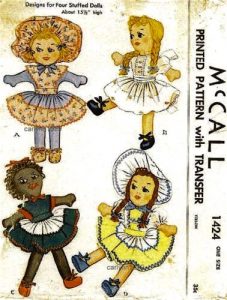Seventy-one years ago, when my mother was expecting me, at a time when pregnant women had to wait to give birth before they knew whether to choose baby clothes in pink or blue, my mother made a doll for me – a black cloth doll she named Lulu.
It’s remained a mystery to me all these years why she did this. I may have asked her at some point when she was still alive, but I never got a clear answer. Perhaps, when I asked, she just looked at me as she often did, with an expression that read, “Why, in Heaven’s name, do you always ask so many questions?” Maybe she just shrugged her shoulders and changed the subject.
Maybe her reason was that she just KNEW I’d be born a girl who would love and cherish dolls. Or maybe she found the McCall’s patterns for stuffed cloth dolls that came on the market in the mid-1940s irresistible, and she had to try her hand at making one. And maybe she just happened to have some chocolate-brown cotton fabric and soft black wool yarn kicking around in her sewing box.

One thing’s for sure: It wasn’t any sort of political correctness that motivated my young mother, Lee, to make an adorable black doll for me. Both of my parents were Republicans who gave little thought to broader social issues. We lived in an all-white, white bread, middle class town in suburban New Jersey. We children were not taught to hate (nor love) blacks because there were none around to hate (or love). They didn’t exist for us.
While other little kids had their “blankies” or stuffed bunnies or teddy bears to cling to, I had Lulu. Lulu was soft and tall – almost 18 inches high – with chubby hands and feet and a hand-embroidered (by my mother) face that was always, always bright-eyed and smiling. Lulu was, for years, my constant companion, a comforter (especially during times of domestic violence in our home), my first best friend.
The fact that her skin color was a thousand times darker than mine and her head was covered in short, braided tufts of black yarn-hair, so unlike my long, blond braids, didn’t matter to me. I didn’t see her differences as “foreign” or “other” or “less than.” She was a part of me. We were inseparable. She represented calm — and unconditional love.
I’m convinced my mother had no clue what the long-term effect my beloved black doll Lulu would have on me.
Fast forward to today and the heightened racial tensions that are wracking the United States as I write this. Every day, with a heavy, aching heart, I read the news online and watch reports on CNN of senseless white-on-black and black-on-white killings and hate crimes. If only, I think, I could say or write or do something that might shed some light or make a difference.
Here I am, a seventy-one-year old white woman who doesn’t fit the mold – whose life experience, from infancy through years spent living in Africa among Africans has given her a completely different point of view. In short: the concept of white superiority is absurd to me; I deeply believe that racism is heinous and slavery was (and remains) America’s original, insufficiently repented sin.
Last week I read in the New York Times online a long, brilliant, and biting Op-Ed essay by Michael Eric Dyson, professor of sociology at Georgetown University, titled “Death in Black and White.” He begins:
“We, black America, are a nation of nearly 40 million souls inside a nation of more than 320 million people. And I fear now that it is clearer than ever that you, white America, will always struggle to understand us.”
Essays, by their nature, are opinion pieces, the author’s point of view, an effort to understand an issue and add a voice to the larger conversation. Dyson’s fierce essay, well worth reading and rereading in full at www.nytimes.com/2016/07/10/opinion/sunday/what-white-america-fails-to-see.html, is a passionate polemic, designed, I believe, to make us all wake up and sit up.
It made me want to speak with him – or write to him – and share my own point of view. But I fear he would dismiss me as an unimportant, know-nothing, “privileged” old white woman whose singular voice isn’t worth listening to.
Later in the essay he makes the broad-brush statement, “At birth, you [white Americans] are given a pair of binoculars that see black life from a distance, never with the texture of intimacy. Those binoculars are privilege; they are status, regardless of your class.”
How I wish I could sit with him, look him in the eyes and say, “No, professor Dyson, I’m sorry, but you’re mistaken on that point. Not all white Americans. I am living proof. I wasn’t given binoculars. I was given Lulu. And she has made all the difference.”
